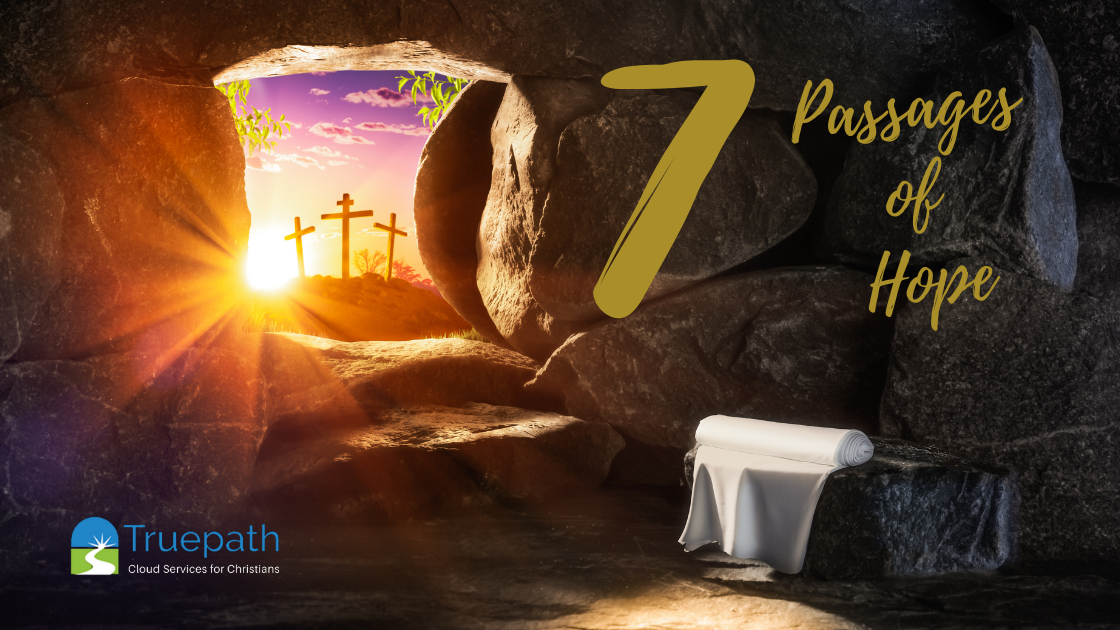Everything you (truly) Need
Why do you do what you do?
It seems a strange question, right?
“Because I have to, or else things will fall apart” could be one answer.
“Because I want to, out of gratitude” is a much different one.
At Truepath, we opt for the second one.
In our efforts to provide you with everything you need to create a first-class ministry website — from easy-to-use WordPress software, to friendly, knowledgeable technical support that’s dedicated to answering your questions online or by phone — we’re here for you.
Ultimately, it’s a reflection of what we believe about the Gospel.
That might sound like religious jargon, but it’s not. Let me explain.
Despite the word’s meaning, there’s a universal tendency – born of our fallen desire to rely on ourselves – to warp “Gospel” into “advice.”
We reinterpret a word that literally means “good news” as: “If I just work hard enough, clean up my act, and do these 8 things, God will accept me.”
In fact, if you really think about it, every religion tends to approach God that way.
Whether it’s the attainment of Nirvana by overcoming your desires (Buddhism); prayer and charitable deeds and making atonement/repentance (Judaism); moral living and belief in karma and reincarnation (Hinduism) – or a legalistic, works-oriented understanding of Christianity – they all ultimately depend on our performance.
And that’s not good news. After all, how do you know if you’re ever worthy or have done enough?
Not only that, it’s the opposite of what the Gospel actually is. As Tim Keller has said,
“The founders of every major religion said, “I’ll show you how to find God.” Jesus said, “I am God who has come to find you.”
We can even be more specific as to how this looks.
At root, these “self-salvation projects” – or ways of trying to save ourselves – typically look one of two different ways.
Again, Keller says,
“There are two ways to be your own Savior and Lord. One is by breaking all the moral laws and setting your own course, and one is by keeping all the moral laws and being very, very good.”
We could elaborate, but Jesus already did for us – by putting it in story form. It’s the well-known parable of “the prodigal son.” (That title is actually unfortunate since it’s actually about two brothers and two approaches to the Father!)
The younger son breaks all the laws and considers his father dead, and squanders his inheritance; the older brother claims to do everything his father wished and yet won’t join the party (a celebration of grace) at the end.
(Strikingly, since Jesus was actually telling this parable to the Pharisees (the very moral, religious types), we can actually discern that the older brother part was really the main focus!)
So what is the Gospel, then?
Thankfully, there is a third way to relate to the Father.
Something wonderful has taken place – completely apart from you and I and our moral performance – and it’s been announced to the world. It’s news – not advice that you have to discover in a TedTalk or “how-to” instruction manual (“for dummies”) to live a more successful life.
Think of it as a birthday or Christmas gift that you didn’t earn, expect, or work for. When it comes, you just receive it with open, grateful hands.
And what is the gift? It’s that God himself has secured the way to be right with him, and has come to find us when we’ve gone astray.
Jesus has kept the law perfectly in our place and died the death we deserve. Now, forgiveness and full acceptance is ours, as a free gift – and so is the faith to receive it (Eph. 2:8,9)
Just like no one does anything in order to to be born into this life as a human baby, the new birth that makes us alive to God and able to trust him is itself a gift from God (Jn. 3:4-6).
And so here’s the thing about moral living and obedience: as believers in Jesus, we don’t now obey out of fear of punishment, or to win or keep God’s affections. We obey because we already have God’s affections, and so want to please him.
Truly, we have all we need in his finished work:
“He who did not spare his own Son but gave him up for us all, how will he not also with him graciously give us all things?” (Rom. 8:32)
and
“His divine power has given us everything we need for life and godliness, through our knowledge of him who called us by his own glory and goodness.” (2 Pet. 1)
In this same spirit…
Truepath’s goal is to give you all you need for your website to run smoothly.
That’s why we provide feature-rich apps and top-tier security to keep your site protected from malicious attacks, or unwanted material.
And just like grace, we don’t require you to be skillful or clever; we’ll take care of it for you – whether migrating existing content, set-up, or ongoing maintenance.
And not only that. We’ll even – if you desire – provide you with expert web design services.
That’s the bottom line: Jesus has given us everything we need, so we want to reflect that heart to his world. And so…
Truepath is here to serve you!



